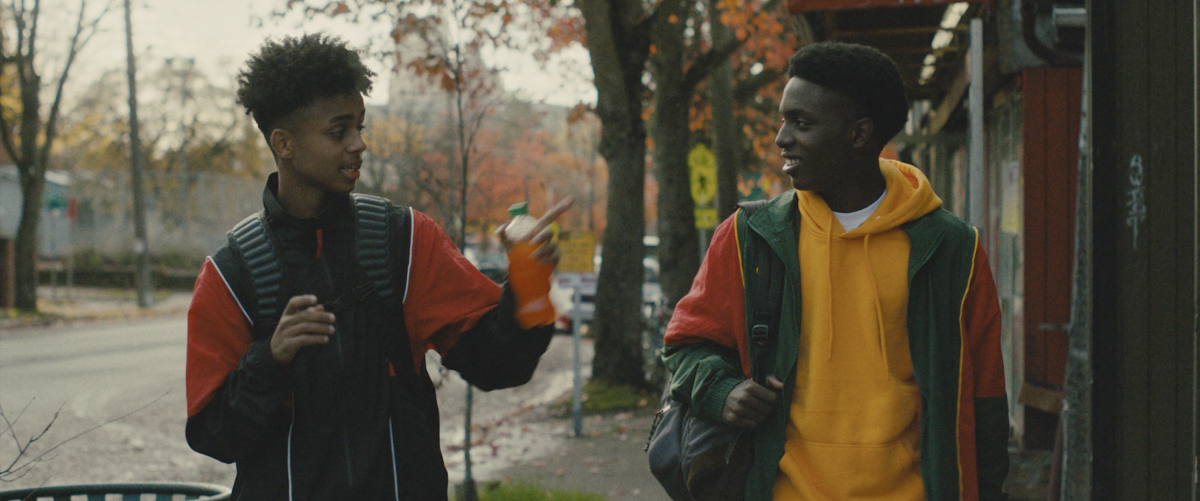
The new film Know Your Place is set in a part of Seattle that's undergoing rapid gentrification. Money talks, those that don’t have walk. But where do you go if you are an immigrant to the U.S. and part of a vital community?
The community in question hails from Eritrea, one of Africa's poorest nations. Eritreans preserve their religion and their native language, difficult to do when you're being forced to scatter. Know Your Place centers on one family, the Hailes, and Robel, a 15-year-old Eritrean-American boy, in particular. Robel is known for keeping his feelings hidden. "You never say nothin', Bro," says his friend Fahmi on the basketball court. "What's on your mind?"
Robel wonders, simply, where he belongs. His father is dead; his mother struggles to keep the family afloat. His grandfather suffers from dementia and sleeps on the living room couch.
And then comes a plea from the parent's homeland: relatives are ailing, medical expenses are high, and they need financial help. Despite her family's own dire circumstances, Mother assembles clothes, money, and medicine to send over. Robel is tasked with delivering a large suitcase full of provisions across town to his aunts.
Writer/director Zia Mohajerjasbi turns this into a lyrical, profound quest, played out on city streets and light rail and buses. Of course, Robel and Fahmi encounter obstacles, but their comradery and street smarts make for a fascinating journey. Know Your Place is thick with Eritrean culture and interludes of quiet grace.
Seattle in autumn has rarely looked so bleak and beautiful. Mr. Mohajerjasbi counterpoints the drama of displacement by sending his camera to wander languidly amongst canopies of tree branches and street signs, segments of visual poetry. Buildings are being torn down. Residential streets are being decimated. Cranes loom over every horizon. Yet the gloom is often cut by pools of light, actual and symbolic. There's hope. The city becomes a living thing, aided by the fluid camera of Director of Photography Nicholas Wiesnet.
Match this with the naturalistic performances of Know Your Place's young protagonists. Joseph Smith's internal reserve as Robel is tweaked by Natnael Mebrahtu's brash Fahmi. Robel frets and Fahmi joshes. The pair make an engrossing odd couple, trekking across town with their literal McGuffin. Days after having watched the movie, I still feel the presence of these characters.
But the notion of "home" is the point. Where do you go when poverty undercuts your mobility yet forces you to keep moving? As Robel says in a moment of pique, "I wish everything would slow down so I can know where I'm supposed to be."
Their path takes unexpected detours and is dotted with compelling characters, most notably Selamawit Gebresus as Robel's mother (who delivers a stunning monologue with the camera tight on her face), Esther Kibreab as Robel's striving sister, Haileselassie Kidane as gansta cousin Aboy, and Tirhas Haile as the cantankerous Auntie Hana. Aaron Sahle plays Uncle Yonas, a rowdy yellow cab philosopher who contends that America is "drowning in a sea of names," but deep down everyone is where they should be. Every member of this ensemble is a believable and welcome swatch in this heartfelt tapestry.
Zia Mohajerjasbi is a filmmaker to watch. He has a particular vision and, for a first-time writer/director, the discretion to make it come alive. He takes risks: despite the rigors of the inner-city milieu, Mr. Mohajerjasbi isn't afraid to stop the action to make a point. One breathtaking montage is of people, just people, in all their normal glory, caught still and facing the camera.
Know Your Place is a warm, rich, and affectionate portrait of an ancient culture unmoored in the modern world.
--------------------------------------------------------------------------
Know Your Place. 2022. Directed by Zia Mohajerjasbi. Available on VOD and in select theaters. 118 minutes.
